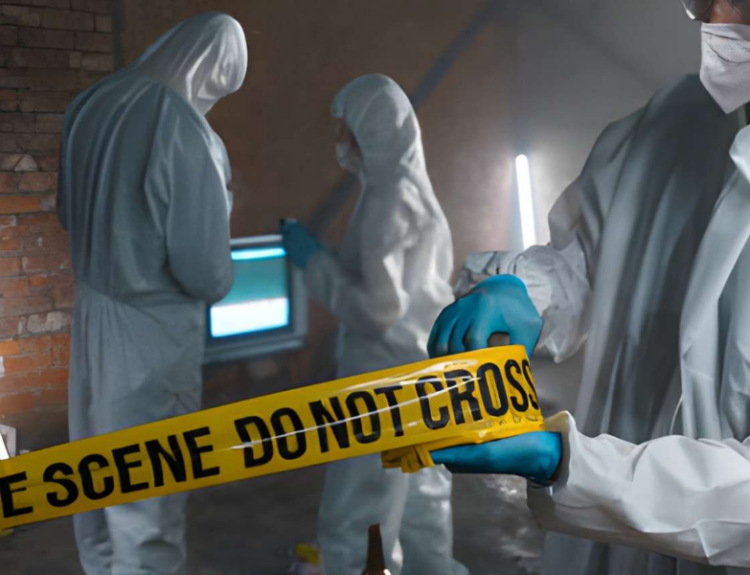Crime scene investigators (CSI), also known as crime scene specialists or forensic science technicians, assist in criminal investigations. The police rely on them for assistance in solving crimes and providing evidence for criminal court proceedings.
To become a CSI you need to have a crime scene investigation degree or certification in the relevant field of forensic science or criminal justice. Many universities today offer CSI degree programs for those who wish to pursue a career in this field. Identifying the specific job duties, educational requirements, and certification requirements can help you determine which degree program is the best choice.
To help you, this researched article outlines who a crime scene investigator is, what they do, the qualifications for the job, and highly recommended degree programs in this field. So without further ado let’s get started.
Key Takeaways
- An ordinary person might think of a CSI as a police officer, but Crime Scene Investigators painstakingly collect, assess, and sustain a variety of evidence and specimens from crime scenes and frequently concentrate of certain specialties like DNA evidence, blood and wounds pattern analysis, or cyber crime investigation.
- A CSI might be confused with a Forensic Scientist, but while a Forensic Scientist is more of a laboratory professional, while a Crime Scene Investigator is much more interactive and is responsible for collecting and organize evidence from the crime scene and the surrounding area.
- Most CSIs today hold a Bachelor’s degree in forensic science, criminal justice, or criminology, but an aspiring CSI might be interested in obtaining a certificate in the field or might have come from police administration.
- Normally, programs will commence with forensic and CSI labs as well as on-the-scene coursework in Crime Scene Reconstruction, Advanced Death Investigation, and electives like Digital Forensics and cold case investigation.
- Some of the most noted institutes are the Ohio State, Michigan State, and Virginia Commonwealth, while more accessible ones include the University of the Cumberlands, Weber State, and Miami Dade.
Who is a Crime Scene Investigator?
A crime scene investigator is someone who uses their knowledge of law enforcement, criminal justice, and forensic science to solve crimes and find the guilty person. Their job involves gathering evidence at crime scenes and analyzing it to determine what happened, who was involved, and how the crime was committed.
As part of their duties, they frequently collaborate with other law enforcement and forensics personnel to share information and evidence, which can enhance their ability to understand what happened before, during, and after the occurrence of crimes.
Although crime scene investigators work with all types of criminal evidence, they may also specialize in certain situations, such as analyzing blood patterns or shoe prints. Various crime scenes are often examined by experienced or specialized investigators, and their findings are used as evidence in criminal trials.
In addition to their distinct combination of skills and experience, each crime scene investigator brings a unique perspective to the investigation, which makes them more appropriate for some cases than others. In most investigations, DNA analysis is the primary focus of the investigation as every crime scene presents a unique set of challenges and evidence.
A career as a crime scene investigator can be extremely rewarding if you have experience collecting and handling DNA samples for analysis by the laboratory.
Crime Scene Investigation vs. Forensic Science Difference
Do CSI and forensic science have the same meaning? Despite their similarities, forensic science and crime scene investigation are two different fields. Crime scene investigation (CSI) focuses on the collection and analysis of physical evidence collected at crime scenes rather than forensic science, which is a broad field with many diverse specializations.
In both forensic science and CSI, physical evidence is used to uncover the identity of criminals, but the roles and responsibilities of each profession differ.
As a forensic scientist, you may have to analyze evidence collected by a crime scene investigator or another member of law enforcement in a laboratory. CSI professionals, on the other hand, examine crime scenes directly, collecting and analyzing physical evidence found there.
As a whole forensic science and crime scene investigation are closely related fields, but they deal with different aspects of the investigation. Forensic scientists analyze evidence in laboratories, while crime scene investigators collect evidence from crime scenes and analyze it on the spot.
What Degree is Needed to Become a Crime Scene Investigator?
As a crime scene investigator, you can pursue a variety of career paths. However, earning a crime investigation degree or certification through an educational institution is the most common path.
-
Bachelor’s Degree Path
A bachelor’s degree program in crime scene investigation is the most common and direct route to a career. Most potential investigators choose to major in a subject that extends beyond crime scene analysis alone. Depending on the degree’s scope, it may include forensic science, criminology, or criminal justice courses. The majority of institutions do not offer these degrees, and forensics-related education may be offered in different locations in some schools, so be sure to consult an academic advisor for more information.
When an applicant holds a bachelor’s degree in forensics or crime scene analysis, they can be confident that they will be well-prepared for their first day on the job. Since these graduates have the most specialized training, they often get the first preference when it comes to employment opportunities.
-
The Certificate in Crime Analysis program
Those who have already completed a bachelor’s degree in a related field, such as criminology or criminal justice degree, may apply for certificate programs in crime scene investigation. Other majors are also eligible. Rather than requiring general education courses as in a bachelor’s degree program, a crime analysis graduate certificate focuses exclusively on crime scene analysis skills.
These programs offer more focused learning than a full degree and include topics such as crime mapping and statistical methods in analysis. This type of criminal investigation certification can be attractive to employers when coupled with a bachelor’s degree in a relevant discipline and perhaps some prior work experience.
-
Pathway Through Professional Experience
Crime scene investigators may also become professionals through their professional experiences. To achieve this, it is often necessary to complete some degree of training to become a police officer or a member of law enforcement.
What Are the Requirements For a Crime Scene Investigator Degree?
There are certain educational requirements for admission to a CSI degree program, including:
- You must be in the top 25% of your high school graduating class.
- A minimum grade point average of 3.00 in competency courses (4.00 = A).
GED
For those who have earned a GED (General Education Development) certificate instead of a traditional high school diploma, specific score thresholds must be met to qualify for admission to a CSI degree program.
A minimum score of 145 out of 200 on a 100-200 scale is best for getting admission to CSI degree programs. The higher the score the more chance of being admitted to the best colleges.
HiSet
Similarly, if you’ve taken the HiSet (High School Equivalency Test) as an alternative to a traditional diploma, you’ll need to meet certain scoring criteria to be eligible for a CSI degree program. For HiSet 45 or higher score is needed in 5 subtests.
CSI Degree Program Curriculum
In most cases, you will be able to gain admission to the CSI bachelor’s degree programs if you meet these criteria. However, there may be some differences in the requirements.
As part of the CSI degree, students will be exposed to methods and techniques for conducting scientific crime scene investigations, including forensic death investigation, firearms analysis and tool marks analyses, crime scene reconstruction, fingerprint development, fingerprint identification, and fingerprint development.
Core Courses for CSI Degree Programs
The core courses provide the essential knowledge and skills needed to become a CSI. From understanding the criminal justice system to mastering forensic science lab techniques, these courses are fundamental to your training as a crime scene investigator.
- The Criminal Justice System
- Investigations using forensic science
- Investigation using Forensic Science Lab
- Research and Investigation: Evidential Reasoning
- Application Development for Public Safety and Security
Crime Scene Investigation Major Requirements:
In addition to the core curriculum, students pursuing a major in Crime Scene Investigation must complete specialized courses. These courses delve deeper into the specific skills and knowledge required to excel as a CSI professional.
- Criminal Investigation: Practice & Theory
- Conduct of Investigation
- Crime & Accident Scene Imaging & Reconstruction (Course & Lab)
- Impression and Pattern Evidence (Course & Lab )
- Digital Evidence & Trace (Course & Lab)
- Crime Scene Professionalism
- Forensic Death Investigation (Course & Lab )
Criminal Scene Investigation Elective Courses:
To further specialize, students can choose from various elective courses that cover different aspects of crime scene investigation. These electives allow students to tailor their education to their specific interests and career goals
- Crimes in the media
- Intelligence and policing ethics
- Drugs and Crime
- Policing Diversity: Race, Gender, and Religion
- Research & Investigation by Applied Probability
- Corrections Practices
- Bias Awareness in Public Safety and Security
- Interrogation and interview
- Cold Case Investigations
- Crime lab forensics
- Forensic Entomology: An Introduction
- Community Policing
Some degrees will have different programs, but most of the above courses will be included.
Online Degree Programs
Some universities also offer crime scene investigation degrees online program. People who can’t attend campus classes or who are not able to afford the expenses of university can join
an online crime scene investigation degree program and get accreditation that will help them pursue a career in this field. Here are the major courses offered in online programs:
- Forensic Science Survey
- Introduction to Criminal Justice
- Crime Scene Photography
- Evidence Collection at Crime Scenes
- Crime Scene Investigation
- Pattern Analysis
- Seminar in Forensic Science
- Courts and Sentencing
- Forensic Science Thesis Development
- Expert Witness Preparation and Practice
5 CSI Degree Programs With High Acceptance Rates
The following are the top five CSI schools ranked by fees, acceptance rates, graduate salary, and student reviews:
-
Ohio State University
The Ohio State University offers a Bachelor of Arts degree in Criminology and Criminal Justice Studies. It is a sociology-based study of the criminal justice system that leads to a degree in crime scene investigations.
The study of criminology offers learners an understanding of different perspectives on crime and explains their prevalence. These include agencies established to control and prevent delinquency. Several programs are available, including the courts, police, probation, and correctional institutions. Topics covered include women and crime, youth and crime, as well as the role of control agencies in society more generally.
- Acceptance Rate: 53%
- Type: On-campus
- Cost:$6,272.50 per credit
- Degree: Criminology and Criminal Justice Studies, BA
An acceptance rate of 53%, gives students an excellent opportunity to pursue higher education.
-
University of Central Oklahoma
Among the best CSI degrees in the USA is the Forensic Science, BS degree offered by the University of Central Oklahoma. The program is accredited by FEPAC in the areas of chemistry and forensic science. Studies in forensic science include the following:
- Chemistry
- Microscopy
- Toxicology
Three undergraduate degree programs are currently offered by the School of Criminal Justice:
- General
- Police
- Corrections
The student should plan on getting an extensive education in chemistry and afterward pursue a graduate degree in one of the three programs mentioned above. Additionally, the school offers the Master of Arts in Criminal Justice Management and Administration and the Master of Arts in Crime and Intelligence Analysis.
- Acceptance Rate: 81%
- Cost: $4,937.40 per year
- Type: On-campus and online
- Degree: Forensic Science, BS
-
East Carolina University
The Criminal Justice, BS degree program at East Carolina University is one of the most competitive in the field of crime scene investigation. Those majoring in criminal justice have the option of selecting an additional minor worth at least 29 credits or taking general electives.
The school offers degrees in crime scene investigation that require 120 credit hours. Courses in general education include political science, psychology, and sociology, while core courses include:
- Criminal Justice
- The study of crime and criminology
- Correctional Systems
- Society and police
- The juvenile justice system
- Criminal Law
As the best public school in Greenville, North Carolina, East Carolina offers forensic science, criminal law and legal process, criminology, and a path to a career in the forensic science crime laboratory.
- Acceptance Rate: 94%
- Cost: $47,760 PY
- Degree: Criminal Justice, BS
- Type: Online
Each March, East Carolina’s Criminal Justice Department hosts a career fair for Criminal Justice Month to honor the university’s #8 ranking in North Carolina.
-
Michigan State University (MSU)
MSU provides a comprehensive criminal justice program for students interested in obtaining a well-rounded education. Its curriculum focuses on law enforcement, corrections, the legal system, and the courts, thereby enabling you to gain a broad understanding of the criminal justice system as a whole.
The criminal justice program at MSU goes beyond teaching legalities; this program focuses on the socio-political, economic, and social factors that influence crime and justice. As a result of this multifaceted approach, you will be prepared to think critically and solve problems in the criminal justice field. The faculty at MSU are accomplished researchers and practitioners who combine academic rigor with real-world experience.
- Acceptance Rate: 71%
- Cost: $16,916
- Degree: Criminal Justice: Forensic Crime Scene Investigation, BS
- Type: On-Campus
-
Virginia Commonwealth University
Criminal Justice: Forensic Crime Scene Investigation, BS is offered by Virginia Commonwealth University for students interested in a career in crime scene investigation. Learners enrolled in this program are prepared to become effective criminal justice professionals.
Many students who earn degrees in crime scene investigation use the knowledge they acquired during their studies to prepare for law school and other careers in the legal industry. Successful graduates have the following entry-level career options:
- Federal, state, and local justice agencies
- Law Enforcement
- Juvenile Justice
- Crime Scene Investigation
In a survey of students, Virginia Commonwealth University ranked highly for diversity and value for money.
- Acceptance Rate: 93%
- Cost:$16,916
- Degree: Criminal Justice: Forensic Crime Scene Investigation, BS
- Type: On-Campus
For students seeking degrees in crime scene investigation, Virginia Commonwealth is ranked among the top 100 schools (out of 585 schools) in the country for criminal justice.
5 Most Affordable Colleges for CSI Degree Programs
People who can’t afford to enroll in expensive crime scene investigation degree programs
can opt for less expensive programs that offer the exact course outline and train students to get the required knowledge. These are 5 most affordable CSI degree programs:
-
Miami Dade College
At Miami Dade College, students can earn a Bachelor of Science degree in Public Safety Management: Crime Scene Investigation, which will prepare them to become field agents with a specialty in crime scene investigation. To be successful in this type of career, one must possess many skills, including the ability to process crime scenes.
The Miami Dade College is one of the most prestigious colleges in Florida and the southeastern United States. In the area of CSI/Public Safety Management, the College offers one of the most comprehensive curriculums available. Teachers and faculty members are committed to ensuring all graduates are on the right track to accomplishing their career goals. In addition to offering support and encouragement, they also provide them with first-hand knowledge that they can apply.
- Degree: BS Applied Science in Public Safety Management
- Cost: $15,586.80
- Type: Hybrid (On-campus/online)
-
Weber State University
Weber State University’s Crime Scene Investigation program prepares students for employment in positions that deal with collecting, documenting, and preserving evidence. A student who has completed the CSI concentration is well equipped for careers such as crime scene investigators, fingerprint analysts, and field evidence technicians.
The professional practice course shows you how to apply photographic theory to real-life situations. You’ll also learn about the laws of evidence, friction ridge analysis, and human anatomy and physiology.
In the western United States, graduates of this program go on to work in crime scene investigation and fingerprint-related units. Some students pursue careers in law enforcement.
- Degree: Bachelor of Science in Criminal Justice
- Cost: $512.72 per credit hour
- Type: On-campus
-
University of the Cumberlands
A Bachelor of Science in Criminal Justice program is available at the University of the Cumberlands for students who are interested in careers in law enforcement or corrections, or who wish to advance to a Master’s degree program.
Students are employed as law enforcement officers and correctional officers in state and local law enforcement agencies. In addition to working at the federal level, many students choose to specialize in federal agencies, such as the FBI, the Department of Homeland Security, the Drug Enforcement Administration, or Customs Enforcement.
Students will also take courses in Sociology and Criminology, Police Science, Corrections, Probation and Parole, Criminal Justice, as well as White Collar Crime. Additionally, students are required to complete an internship.
Students earning a Bachelor of Arts degree in Criminal Justice complete the same curriculum as graduates of a Bachelor of Science degree in Criminal Justice but also add a world language to their education.
Students who wish to continue their studies may enroll in the school’s Master’s program in Criminal Justice.
- Name: Bachelor of Science in Criminal Justice
- Cost: $9,875
- Type: Online or On Campus
-
Middle Tennessee State University
Middle Tennessee State University’s Bachelor of Science in Criminal Justice Administration program provides students with the necessary knowledge and skills for a successful career in criminal justice administration.
There are three undergraduate programs offering Bachelor of Science degrees in criminology, emergency management and homeland security, and law enforcement. For non-CJA majors, minors in Criminal Justice Administration, Criminal Investigations, and Homeland Security are available.
It is also possible to pursue a Master’s degree in Criminal Justice at the school. As a student, you can choose between a thesis and a non-thesis option. This program provides current criminal justice professionals with an opportunity to advance their careers in the field.
- Degree: Bachelor of Science in Criminal Justice Administration
- Cost: $444 per credit
- Type: On Campus
-
Wayne State College
The Criminal Justice Department at Wayne State College offers both a Bachelor of Arts and a Bachelor of Science degree program.
Students who complete the 120-credit program are prepared for careers in law enforcement, corrections, or a variety of other areas. During the program, students are provided with practical knowledge and skills that are essential for a successful career in the criminal justice field.
The criminal justice program offers courses such as Introduction to Criminal Justice, Police and Society, and Report Writing for Criminal Justice Professionals.
Additionally, students are required to complete the Senior Seminar. There are several elective courses available, including Homeland Security, Criminal Investigation, and Gangs and Organized Crime.
- Degree: Bachelor of Arts and a Bachelor of Science degree in criminal justice
- Cost: $8347.50
- Type: Online
5 CSI Degree Programs With no GMAT Requirement
People who have low GMAT scores or are not willing to take this test for CSI can choose from the following programs:
-
BS Criminology and Criminal Justice, University of Nebraska–Omaha (Omaha, NE)
Through the 36-credit program of Criminology and Criminal Justice, at the University of Nebraska–Omaha, students will gain a deeper understanding of the criminal justice system, its history, and its current state. Some courses examine crime in general, ethical issues, mental health matters, and programs that aim to reduce crime. Students may complete this nationally ranked program either online or on campus, depending on their preferences.
Students wishing to enter this program must hold a bachelor’s degree from an accredited institution and have a grade point average of at least 3.0. The minimum language proficiency score for international students is also required. A statement of purpose and two letters of recommendation are required as part of the application process.
- Degree: BS Criminology and Criminal Justice
- Cost: $15,156
- Type: Hybrid format (on-campus/online).
-
BA, Criminal Justice, University of Massachusetts Global (Irvine, CA)
This 120-credit-hour Criminal Justice program offered at the University of Massachusetts Global is designed to train aspiring crime scene investigators for new careers or to enhance the knowledge that they have already acquired. The course concentrates on investigation techniques, the documentation of research, general methodology, and an overview of the judicial process for crime scene investigators. There are two options for completing this program: online or in a hybrid format (online and on-campus).
A complete online application must be submitted by the applicant as part of the application process, as well as official transcripts from all colleges and universities attended, a minimum cumulative grade point average of 2.0,
- Degree: BA in Criminal Justice
- Cost: $60,000
- Type: Hybrid format (on-campus/online).
-
MS in Investigations, University of New Haven (West Haven, CT)
A 30-credit online Master of Science in Investigations program by the University of New Haven is designed for advanced students and offers a comprehensive understanding of modern investigative theory. The program offers specializations in computer crime, financial crimes, and general criminal investigations. The program is entirely online.
An application form, official transcripts from all colleges and universities you have attended, a statement of purpose, CV, letters of recommendation, and IELTS or TOEFL scores are required for international applicants. There is no requirement for GRE or GMAT scores. As a result of this program, students are prepared to work as investigators in public as well as private institutions.
- Degree: Master of Science in Investigations
- Cost: $$1,136 per credit hour
- Type: Online
-
MS in Criminal Justice, Southern New Hampshire University
There is an online MS in criminal justice program offered by Southern New Hampshire University. This program provides students with a deep understanding of critical areas within the criminal justice field.
This program requires the completion of an online graduate application and a transcript release form for any colleges attended. A GRE or GMAT score is not required for admission.
There are 36 credit hours required for the program. The main objective of the core courses is to assist students in developing their leadership abilities, data-driven decision-making skills, and an understanding of the judicial process and court system.
Graduates of the program may choose to pursue careers in law enforcement, government, security, and corrections, as well as advocacy and policy work for the community.
- Degree: MS in criminal justice
- Type: Online
- Cost: $19,770
-
BA in Criminal Justice Lamar University
The criminal justice management program at Lamar University provides a comprehensive overview of all aspects of criminal behavior, including psychology, sociology, and law enforcement.
There are 72 credit hours in the program. Students are prepared to interact with people of all backgrounds, make the right decisions in stressful situations, and keep abreast of policy and regulatory changes. Among the courses offered are Criminal Procedures & Evidence, Court Systems & Practice, Fundamentals of Criminal Law, Criminal Investigation, Advanced Criminal Law, Juvenile Justice System, and many others.
- Name: Bachelor of Arts in Criminal Justice
- Type: Online and on-campus
- Cost: $29,760
What Kind of Job Can I Get with a Degree in CSI?
Jobs in CSI may be obtained through a career in law enforcement. It is often the case that police officers work with crime scene investigators and that they may discover that there are job opportunities within their department when they work in law enforcement. Most people who decide to begin a career in crime scene investigation begin by working in or with a police department.
Additionally, CSI jobs are often advertised on traditional job boards and related services. A traditional method of finding employment in CSI may be effective if you are looking for opportunities. Finding entry-level positions does not necessarily require working with connections within the police department or federal law enforcement agency.
Data published by the Bureau of Labor Statistics provide detailed information about median salaries and expected growth for various professions. In 2023, the most recent year for which data is available, the median salary for a crime scene investigator was $67,440.
Here are some of the jobs and salaries (Indeed and ZipRecruiter) to pursue after getting a CSI Degree:
- Fingerprint technician
National average salary: $44,262 per year
- Evidence technician
National average salary: $45,695 per year
- Crime Laboratory Analyst
National average salary: $50,850 per year
- Forensic specialist
National average salary: $52,974 per year
- Investigative Reporter
National average salary: $$35,439 per year
- Corporate Investigator
National average salary: $$99,399per year
- Court Administrator
National average salary: $82,029 per year
- Fingerprint Specialists
National average salary: $45,161 per year
- Forensic pathologist
National average salary: $219,325 per year
Conclusion
Here is everything you need to know about Crime Scene Investigation degree. If you seek a police career, criminal justice, and forensic science then getting this degree is the best route. We have outlined various universities and degree programs to check out and see which suits you best.
It doesn’t matter which university or degree program you enroll in, what matters is your hard work, dedication, and commitment. So work hard and fulfill your dreams.







